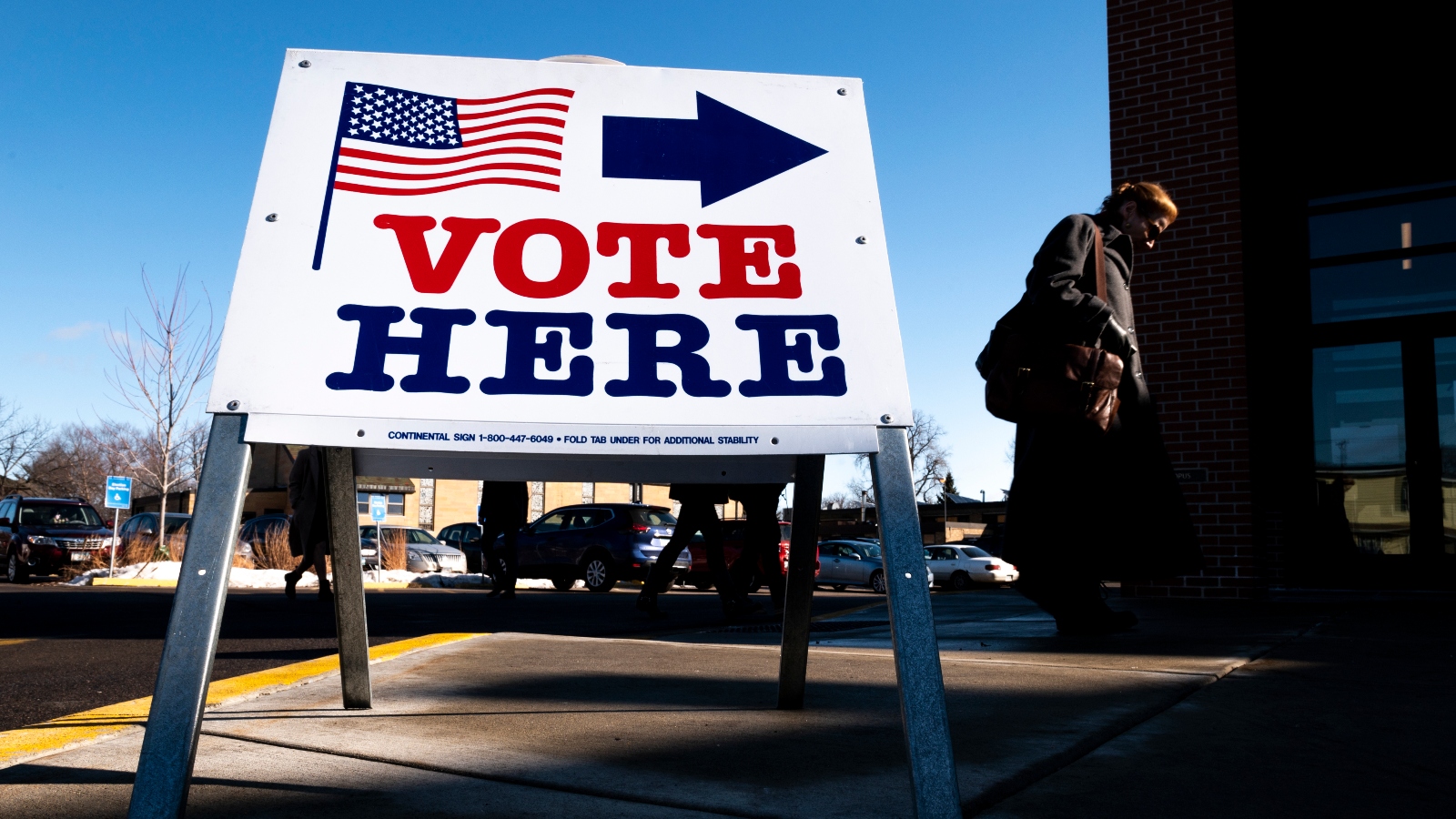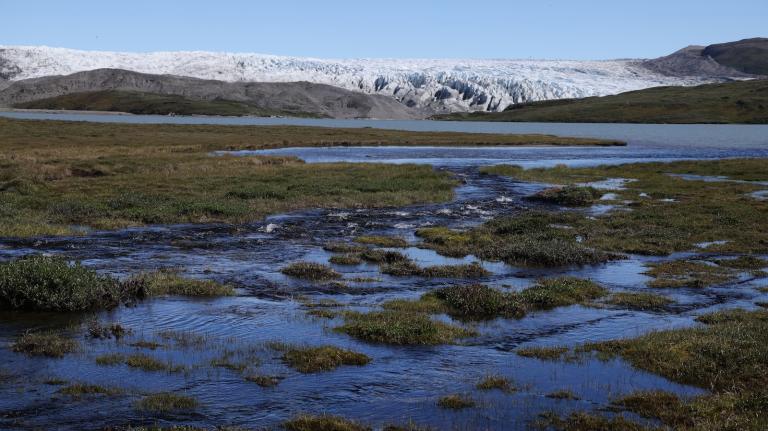After the hottest 12 months on record, during which fossil fuel production and extreme weather surged, the climate change stakes in the November 5 election have never been higher.
Candidates from the White House to utility commissions are campaigning on everything from the rollout of billions of dollars in climate funding from the Inflation Reduction Act, to our nation’s future energy mix, to rising home insurance costs, to the scientific consensus around global warming.
While these races get the majority of media coverage, their climate consequences will take months and years to take shape, as elected officials propose and enact policies during their terms. More immediate, however, are the dozen-plus state ballot measures that Americans are voting on on Tuesday. These referendums could instantly reshape climate, energy, and environmental policies around the country — some hindering action, others spurring it.
As you head to the polls, here is a full guide to all of the critical measures on the ballot this week:
Arizona
- Proposition 135: Restrictions on the Governor’s emergency powers.
The Republican-led proposition terminates the governor’s power during a state of emergency after 30 days unless extended by the Arizona legislature or in the case of war, flood, or fire. The current limit is 120 days.
Emergency powers are used for various reasons, like public health emergencies, civil unrest, security threats, and economic emergencies. But they can also be used for extreme weather disasters, like heat and droughts. Current Governor Katie Hobbs declared a state of emergency last August after several counties experienced 30 consecutive days of excessive heat warnings over 100 degrees. The declaration allowed her to immediately execute a comprehensive plan to save lives and deal with extreme heat in the future. Nearly 650 people died during that heat wave.
One of the reasons governors have emergency powers is to mobilize all state resources quickly without wading through political bureaucracy in the state legislature. But the limits mean the governor can’t exercise too much power.
The proposition was sponsored by Arizona Representative Joseph Chaplik, who said that the two-year-long COVID state of emergency was “executive rule” and “should never happen again.” However, former Governor Doug Ducey signed a bill in May 2022 reducing his powers to 120 days, allowable in four 30-day increments.
Some believe restricting the governor’s powers during a crisis doesn’t make sense. The Arizona Public Health Association says that the powers are crucial tools in responding to future health crises, and overturning the outcome of Proposition 135 would be very difficult in the future.
Voting yes limits the governor’s emergency powers to 30 days unless extended by the legislature.
Voting no keeps the current system, where emergency powers last up to 120 days.
California
- Proposition 4: The Safe Drinking Water, Wildfire Prevention, Drought Preparedness, and Clean Air Bond Act.
The state wants to borrow $10 billion to respond to climate change. The bond prioritizes lower-income communities and those most vulnerable to climate change.
Approximately $3.8 billion would fund water projects: half for water quality improvements and half for flood, drought protection, and river restoration. The rest would go to wildfire and heat projects, natural lands, coastal protection, clean energy, and agriculture.
Supporters say the state must act quickly in the face of extreme climate change, including wildfires, air and water pollution, and extreme heat. Opponents argue that bonds are the most expensive way to pay for things and could be spent on unproven technology. Analysts claim the bond could be paid back over 40 years at $400 million a year, costing the taxpayer $16 billion.
Voting yes approves borrowing $10 billion for climate-related projects.
Voting no rejects the bond.
- Proposition 5: Lower Supermajority Requirement for Local Special Taxes to Fund Housing and Public Infrastructure
Local governments need a two-thirds majority of those voting if they want to borrow money. Proposition 5 lowers that to 55 percent for lending to fund affordable housing, down payment assistance, and various public infrastructure projects, including water management, hospitals, police stations, broadband, and parks. The change would apply to future bonds and those on November’s ballot.
If Proposition 5 passes, it would lower the threshold for the $10 billion bond, meaning localized environmental projects could go ahead.
Supporters say the new proposal is more democratic, taking the power away from one-third of voters and allowing local officials to meet their communities’ needs better. Opponents say it’s always easy to support taking on more debt if you don’t have to pay it back. They believe the taxes to repay loans will come from property taxes.
Voting yes lowers the voting threshold from two-thirds to 55 percent to pass bonds for local housing and infrastructure projects.
Voting no keeps the two-thirds requirement.
Colorado
- Proposition JJ: Retain Sports Betting Tax Revenue for Water Projects
The proposal allows the state to retain tax revenue from sports betting above $29 million per year and appropriate the funds to the newly established Water Plan Implementation Cash Fund. Tax revenues above $29 million are currently refunded to casinos and sports betting operators.
The water cash fund projects include conservation, drought mitigation, and water infrastructure improvements. Funding water projects in Colorado is crucial due to the state’s ongoing water scarcity challenges, driven by prolonged drought, population growth, and climate change.
Water is essential for agriculture, drinking supplies, and the environment, and well-funded projects help manage and conserve this limited resource. Investments in water infrastructure, conservation, and drought mitigation ensure that Colorado can maintain a sustainable water supply, support its economy, protect natural ecosystems, and safeguard against the impacts of future water shortages.
Supporters argue that these funds are crucial for addressing Colorado’s water challenges, while opponents say the proposition circumvents state tax laws, will increase taxes on sports betting and reneges on the tax refund system.
Voting yes allows the state to use excess sports betting revenue for water conservation projects.
Voting no caps the use of sports betting revenue at $29 million.
Florida
- Amendment 2: Right to Fish and Hunt
The amendment seeks to add the right to hunt and fish to the state constitution.
Proponents argue it safeguards traditional practices and supports Florida’s outdoor heritage and economy. They believe it will protect hunting and fishing from future bans seen in other states.
Opponents warn the amendment could weaken existing wildlife protections, disrupt property rights, and prioritize hunting over more sustainable conservation methods. They argue it may lead to increased environmental and regulatory challenges in managing Florida’s natural resources.
Voting yes adds hunting and fishing rights to the state constitution.
Voting no keeps hunting and fishing regulated under current laws.
Louisiana
- Louisiana Outer Continental Shelf Revenues for Coastal Protection and Restoration Fund Amendment
This amendment clarifies that federal revenues from renewable energy production on the Outer Continental Shelf, or OCS, like wind and solar, will be included in Louisiana’s Coastal Protection and Restoration Fund. Oil and gas revenues have been the overwhelming source of funding so far.
Renewable energy royalties would be split between the state’s Mineral and Energy Operations Fund (25 percent) and the General Fund (75 percent) if the change isn’t made. The coastal protection purse is primarily funded by the $8.5 billion in fines and settlements related to the 2010 Deepwater Horizon settlement, which will expire in 2032.
The amendment would ensure Louisiana has new sources of revenue to fund coastal restoration projects, which are significant for climate adaptation, mitigating coastal erosion and storm impacts. The revenues will likely be significantly lower than current levels, projected to be nearly $2 billion over the next decade, according to the offshore industry’s trade association president. A series of bipartisan federal bills are also in the works to ensure the plan can proceed.
Supporters argue it diversifies funding for essential coastal protection. Opponents say funneling the money to the coast is unfair to inland parishes and want to see the revenues shared evenly.
Voting yes directs renewable energy revenues to the state’s coastal protection fund.
Voting no keeps the funds going to other state operations.
Maine
- Question 2: Bond Issue for Research and Development
This initiative allows Maine to issue up to $25 million in bonds to support the Marine Technology Institute’s research on environmental and renewable energy technologies. It’s crucial for advancing sustainable practices and technological innovation in addressing climate change. Proponents believe green technology will drive economic growth, while opponents may argue against increased state debt.
Voting yes allows the state to issue $25 million in bonds to support marine technology and renewable energy research.
Voting no rejects the bond.
- Question 4: Bond for Trail Development
This initiative authorizes $30 million in bonds over four years to design, develop, and maintain trails across Maine. The question posed to voters comes after a review of state trails noted frequent rain and extreme storms had severely damaged them.
This investment enhances outdoor recreation and promotes environmental conservation by creating green spaces and protecting natural habitats. Supporters see it as a boost for tourism, conservation and the state economy. While the bill passed with overwhelming bipartisan support, a 2019 poll noted that around 26 percent of 600 registered voters said they would not favor a bond to maintain and develop trails.
Voting yes authorizes $30 million in bonds to maintain and develop outdoor trails.
Voting no rejects the bond.
Minnesota
- Amendment 1: Environment and Natural Resources Trust Fund Renewal
This initiative renews the transfer of lottery proceeds to Minnesota’s Environment and Natural Resources Trust Fund, supporting water, wildlife, air quality, and parks through 2050. The Environment and Natural Resources Trust Fund has directed $700 million to 1,700 projects since it was created in 1991.
It’s vital for state environmental conservation efforts. Supporters highlight the importance of continued funding for environmental protection.
Voting yes renews the use of lottery proceeds to fund environmental and natural resource projects through 2050.
Voting no stops this funding.
North Dakota
- Constitutional Measure 3: Change requirements for transfers from the state legacy fund, a fund that receives 30 percent of tax revenue from oil and gas production
This measure alters how funds from state oil and gas revenues are used. The state’s legacy Potentially impacting environmental and conservation efforts tied to the Legacy Fund. Proponents argue it improves fiscal management; critics worry about reduced funding for environmental projects.
Voting yes decreases the amount of oil and gas revenue funds used.
Voting no maintains current use of oil and gas revenues.
Rhode Island
- Question 4: Environmental and Recreational Infrastructure Bond
This measure authorizes $53 million in bonds for environmental infrastructure and recreation, supporting conservation and enhancing public spaces. It’s crucial for preserving natural resources and improving public access to green areas. Supporters believe it strengthens environmental protection, while opponents may oppose the financial impact of new bonds.
Voting yes approves $53 million in bonds for environmental infrastructure and recreational projects.
Voting no ejects the bond.
South Dakota
- Referred Law 21: Regulation of Carbon Dioxide Pipelines
This initiative asks voters whether they want to uphold or repeal a carbon dioxide pipeline regulation law that affects environmental and safety standards. It’s relevant to climate change discussions due to CO2 management and general pipeline safety. Proponents support the stricter regulations; opponents say it’s a hurdle for energy projects.
Voting yes supports stricter regulations for carbon dioxide pipelines.
Voting no means no regulation.
Washington
- Initiative 2066: Natural Gas Access Requirement
This initiative mandates gas access and prohibits restrictions on natural gas use by state and local governments. It matters for climate policy as it could counter efforts to reduce fossil fuel dependence. Supporters advocate for energy choice, while critics argue it hinders clean energy transitions.
Voting yes ensures access to natural gas by preventing local and state restrictions on its use.
Voting no allows local governments to restrict or phase out natural gas use.
- Initiative 2177: Prohibit Carbon Tax Credit Trading
This initiative seeks to repeal the state’s carbon cap-and-invest program, blocking carbon credit trading. It’s significant for state climate action plans. Proponents argue against market-based carbon pricing; opponents see it as a critical tool for reducing emissions.
Voting yes repeals the state’s carbon credit trading program.
Voting no keeps the carbon credit trading program.
Correction: Proposition JJ was originally listed under California. It is a Colorado ballot measure.




